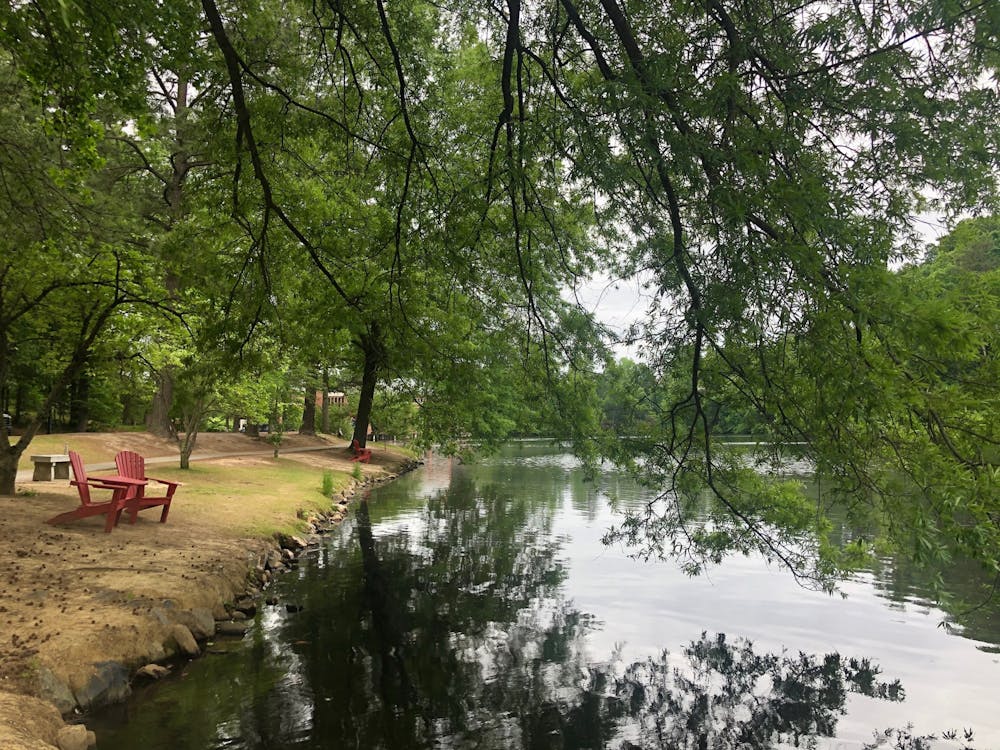As the sunset peers through his bedroom window, University of Richmond '20 graduate Ross Abrash prepares himself for his meditation. The smell of incense lingers in his room as it slowly burns. Abrash sits down and begins to reflect on the day behind him.
He pauses, and begins, patiently, to open his mind, sometimes speaking his thoughts out loud as he envisions the people he saw, the emotions he felt and the significant moments throughout his day. His evening routine of going down his mental checklist is only the beginning of his meditation and happens to be one of the many practices he learned through The Center for Koru Mindfulness curriculum, which is taught in a Koru mindfulness stress-reduction program for undergraduates taught by UR faculty.
Over the summer, students had the opportunity to take a four-week Koru mindfulness course with select faculty members dedicated to teaching students ways to focus on the present moment instead of building up unnecessary stress.
The Center for Koru Mindfulness was based on research conducted by Libby Webb and Holly Rogers, two researchers at Duke University who studied the results of meditation-based relaxation and varied exercises as well as the way undergraduate students benefited from a few of these practices per day, according to the Center for Koru Mindfulness website.
Webb and Rogers found that students who practiced daily mindfulness had lower stress and anxiety levels than their peers, according to the Center for Koru Mindfulness website.
These results prompted the researchers to create a simple curriculum-based program, developed alongside Margaret Maytan, who was, at the time, a psychiatry resident at Duke who had also been teaching mindfulness skills, that teaches students meditation techniques they can use in their daily lives, according to the website.
“It’s a discipline,” professor Kathleen Skerrett said. “It’s a practice of cultivating your attention and your intention. Your attention to yourself, to your own sensations, responses and thoughts. And your intention to become someone who is responsive and skillful in your responsiveness and less of someone who is reactive and overwhelmed.”
In an effort to bring mindfulness to UR, Skerrett and political science professor Monti Datta used funds from the Provost's Office to invite the founders of the Center for Koru Mindfulness curriculum to visit UR to teach faculty members mindfulness techniques and ways to implement them into their classrooms, Datta said.
“It was a two-day intensive training to kickstart the Koru process,” Datta said. “We did the training about one year ago. And we had about 20 or 30 people. And that started the process, and those who are continuing in the process are getting certified by teaching different classes.”
Yet, UR has had mindfulness programming on campus for the past five or six years, Datta said.
Mindful Mondays, created by Associate Director of the Academic Skills Center Roger Mancastroppa in 2013, are one example. Mindful Mondays are meant to give students a space to practice mindfulness and meditation and share their experiences, according to UR's website.
The Center for Koru Mindfulness curriculum has been adapted specifically for UR, Datta said. The structure of the course is adaptive to what the students want to take away from each meeting, he said.
Enjoy what you're reading?
Signup for our newsletter
“Every week we introduce one or two basic meditation techniques to the students,” Datta said. “Some of the techniques the students might like or they might dislike, and so they kind of pick and choose what works best.”
Natalie Szumel, '20, one of Datta's Koru mindfulness stress-reduction program students this summer, said she had discovered more about herself through meditation and being mindful.
“It makes you learn about yourself, which I didn’t realize was a goal of meditation,” Szumel said. “You’re also more aware of your emotions, so it can help with emotion regulation. It just helps you to have more patience and love for people. In our climate, we could all use some more love and patience even when tensions are high.”
Contact news writer Quinn Humphrey at quinn.humphrey@richmond.edu.
Support independent student media
You can make a tax-deductible donation by clicking the button below, which takes you to our secure PayPal account. The page is set up to receive contributions in whatever amount you designate. We look forward to using the money we raise to further our mission of providing honest and accurate information to students, faculty, staff, alumni and others in the general public.
Donate Now



